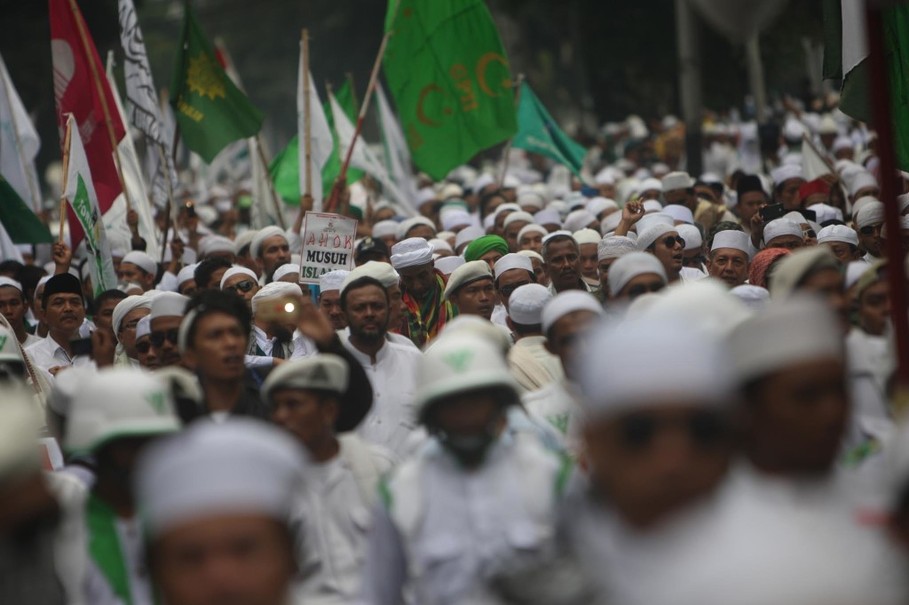
Rising Tensions in the Jakarta’s Gubernatorial Election Show a Country at Risk of Complete political polarization over religious conflict
At present there are three major contenders in Jakarta’s gubernatorial election; Ahok Tjahaja Purnama, Agus Harimurti Yudhoyono and Anies Baswedan. Ahok, the incumbent governor, is in coalition with the deputy governor Djarot, while the Gerindra Party and Prosperous Justice Party (PKS) are backing the former culture and education minister Anies. Anies is in coalition with businessman Sandiaga Uno. The third nominee Agus, is backed by the Democratic Party, The National Mandate Party (PAN), The National awakening Party (PKB) and the United Development Party (PPP). In the run up to the election on February 15th, the Ahok-Djarot camp is cautiously optimistic, while Agus and Sylvi are preparing for tough competition, and team Anies-Sandiaga remain confident that their rhetoric will win the hearts of the Jakartans.
Throughout the election, tensions have been high with increasing rallies and protests against candidates. Ahok stands as the most controversial candidate: he is the first Christian and ethnic Chinese candidate in Jakarta’s history, has a straightforward speaking style, and is outspoken on religious issues. The persecution of Ahok for allegedly insulting the Quran while introducing a new economic programme in a village has brought about some of Indonesia’s largest protests in history, with protesters demanding his arrest under the blasphemy law. According to Al Jazeera news, Ahok remains adamant that “this happened only because we are heading towards elections. Those who have reported me to the police are all connected to each other”.
This coming election reflects an increase in persecution of religious minorities and mix between religion and politics. The country has an ideology called Pancasila, which is a set of interrelated principles, set in place to recognize the six religions in the country. These principles have been put in place to try a keep religious bias out of politics, by recognising the six religions, although as the country is 87% Muslim, Muslim leaders have increasing influence over voters. Ahok has divided the country, with many prominent Muslim leaders swearing that voting for Ahok equated a vote against Islam. The country’s biggest Islamic organization MUI have been one of the many backing voices of the protests against Ahok’s candidacy causing a this polarization of voters. President Joko Widodo and former President Yudhoyono have all made statements in the tense debate, with current president trying to pacify and urge for calm whereas the former President has urged for the prosecution of Ahok.
Presently Ahok seems the most suitable candidate due to the number of successful policies he has put in place. These included the cleaning of the river system, provision of low cost housing and improvement in infrastructure. Polls reflect that Ahok has the most popular vote but only by a slim margin. The team of Ahok-Djarot was favoured 38% to 36% of Anies-Sandiaga so with the undecided votes at 25.7%, only time will tell which duo will take over the gubernatorial positions.
Although Anies has made some progress as education minister, with abolishing new student initiation and establishing the Kartu Indonesia Pintar programme, there is still much left to be done, not only with his policies but with his charisma and connection to the people. Anies seems to be a safe candidate which will not polarize the Indonesian population, but cannot be expected to bring about drastic changes for the greater good either.
Agus, the youngest candidate, looks optimistic as the eldest son of the former president Susilo Bambang Yudhoyono with already a number of achievements under his belt. His leadership traits have been obvious from a young age, was a best cadet in the military academy, and has three master’s degrees from Nanyang, Harvard, and Webster University. Although Agus possesses the greatest risk of all, he has teamed up with Sylviana who is a career bureaucrat who will hopefully cover his lack of practical governing knowledge.
So who will be the best governor for Jakarta in the coming years? Only time will truly tell, but no matter the result we can be assured that Jakarta’s new governor will usher in an interesting and unprecedented era in Jakarta’s political history.
Phoebe Thomas, Gr. 11